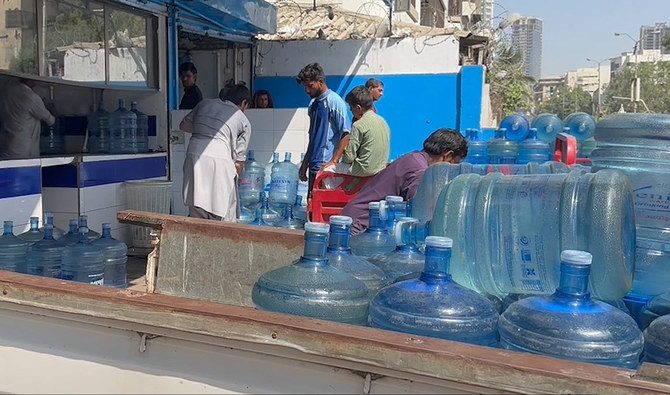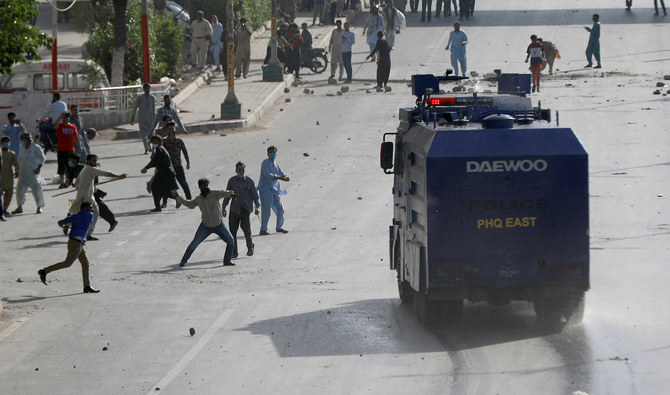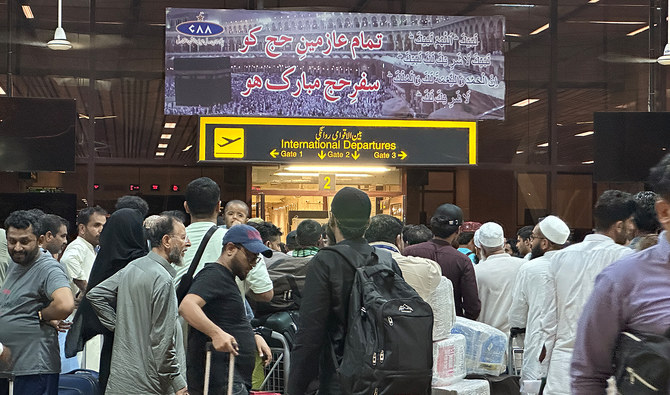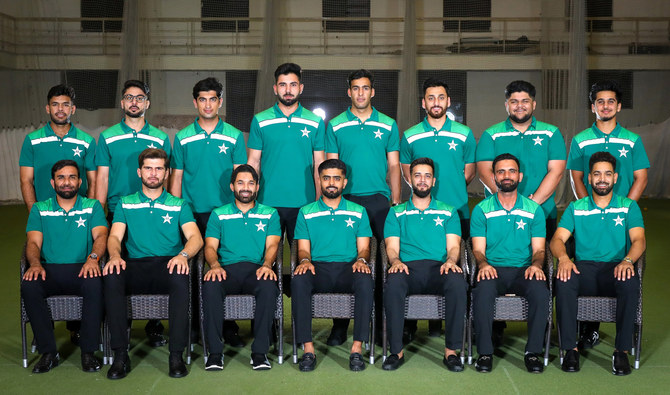LAHORE: Data and interviews with experts and paediatricians show Pakistani children are suffering from prolonged respiratory illnesses due to increasing air pollution, with health practitioners warning of a rise in cases of hypertension, heart diseases and even cancer among young Pakistanis in the absence of a “national action plan” to tackle worsening air quality levels.
Pakistan is the fourth most polluted country in the world, with almost all of it’s 220 million people living in areas where the annual average particulate pollution level exceeds the WHO guideline, according to IQAIR, which monitors air contamination worldwide.
The country’s eastern city of Lahore, the second largest by population and area and the capital of Punjab province, is among the world’s most polluted urban centers, with IQAIR recording an Air Quality Index (AQI) of 438 in the city in peak smog season last November, a figure that was globally the highest at the time. Compare this to the fact that air is only healthy up to an AQI of 50 and children suffer the most from pollution since they breathe more rapidly than adults and inhale more pollutants.
“We frequently put up the worst numbers,” Professor Waqar Hussain, a paediatrician at Lahore’s Shalimar Hospital, told Arab News, saying the AQI for Lahore frequently veered between 300 and 400: “This is a calamity of epic proportions.”
“Smog destroys respiratory cilia [which clean up debris in human airways], and once gone, the cilia can’t slow down a virus or an infection,” he said. “Our kids already have low immunity because of nutritional deficiencies, and when combined with environmental pollution, these infections become deadly.”
Hussain said air pollution caused more than 50 percent of lower respiratory infections among children, while pregnant women exposed to toxic air were also likely to give premature births with potential complications.
“The UK and the US have the same viruses and infections as us,” Hussain said, comparing Pakistan’s situation with developed countries. “Upper respiratory tract wise, we all see about 10 episodes per year in a child. But in the lower respiratory tract, in the lungs, our numbers [in Lahore] are four times higher. Pneumonia, for instance, asthma, childhood cancer, early age cardiac problems are all in higher incidence here.”
Smog can also lead to fatal complications with diseases like tuberculosis and prolong respiratory infections.
“America’s school going children get a lot of viral infections but they get better in a week,” he said, while children in Lahore suffered for months in such cases.
“IT’S A CRISIS“
Hussain said he was involved in a recent study that randomly sampled school children from different social strata in Lahore for medical checkup.
“From government schools to elite private schools like Aitchison, when the tests came back, 20 percent of the children were diagnosed with asthma,” he said. “Their families had no idea.”
In terms of children’s illnesses, he said last year was among the worst he had ever witnessed in his medical career.
“That’s why I conducted a seminar this January,” he added. “We called experts. It’s a crisis, we have to do something.”
“The mixture of surface level ozone, nitrogen dioxide, fine particulate matter, sulfur dioxide, lead, it’s a case of picking your poison,” Hussain said while explaining the effects of smog on children. “Fetal development is badly affected. Air pollution also impairs neurodevelopment and cognitive function. Autism is rapidly increasing. These are all things I’m witnessing every year now.”
Pakistan Pediatrics Association’s Punjab President Dr. Naeem Zafar said the rise in the number of serious diseases among children in recent years may also have something to do with the coronavirus pandemic that started spreading in late-2020.
“I think COVID-19 has exacerbated problems [of pollution] in a population with already weakened immune systems,” he told Arab News. “Then there are many influenza strains that have recently evolved.”
“Look, we have had smog for decades,” he added. “There were government commissions set up in the 70s, in the 80s, there were short term or aesthetic remedies, visible smog was reduced but the air quality remained bad. The surge in mortality you’re seeing these last few winters probably has more to do with the viruses. They’re much worse now, even in adults.”
However, Professor Hussain was not convinced and said viruses had been around for thousands of years while pandemics happened periodically.
“We said this in the seminars. It’s to do with smog. We are not doing anything, as a government, as a society. We invited everyone to the seminar, our association went to the health department, but no public policy promises were made.”
Hussain pointed out the United States, United Kingdom and China burned more fossil fuels than Pakistan, but they had also improved the overall environmental situation in the last many years as climate change became a reality.
“We join a committee, give a recommendation, then what? Where is the implementation? Pakistan lacks a coordinated national action plan on air pollution,” he said.
Arab News reached out to Syed Hammad Raza Bukhari, the Punjab health department spokesperson, several times to seek comment for this story but he declined.
Noor Ahmed, a deputy director for the Environmental Impact Assessment (EIA), a research project launched by the Environmental Protection Department (EPD) to monitor Punjab province, was also unavailable for comment.
“THINGS ARE GOING TO GET WORSE“
Dr. Shahzad Khurram, a paediatrician with 15 years of experience running his private clinic, said his anecdotal experience was the same as Professor Hussain’s.
“I treat young kids with bronchitis, ear infections, problems in the nasal passage, and pneumonia every day,” he told Arab News. “I treated a three-year-old child who had asthma for almost two years. No family history, nothing wrong with the child at birth.”
And while it was difficult, he said, to pinpoint smog as a cause, it was not impossible:
“Sometimes the respiratory problems are genetic, sometimes they’re allergies, from pollen, sometimes it’s influenza, but oftentimes we are seeing coughs and shortness of breath without any apparent cause. That’s when we know it’s smog.”
Taken in isolation, he added, these barely constituted two percent of the cases.
“But we don’t exist in isolation,” the doctor said. “If you ask me, the diseases that smog has made much, much worse, that number goes up to 50 percent. Half the children I see are presenting with symptoms much more severe than their illnesses should be presenting with.”
“I see chronically inflamed tonsils. Narrowed nasal passages in growing children. Children using inhalers twice as often as before,” he added.
Preventively, one could wear a double surgical mask, use nebulizers, take steam, monitor the daily AQI and stay in if it was very high, but these were short term alleviations.
“There are going to be more and more young people with heart diseases, hypertension, cancer,” Khurram warned. “These are just the facts out there. Things are going to get worse. It’s not just the air either, it’s the water, the food. But we simply aren’t responding as a society.”
















